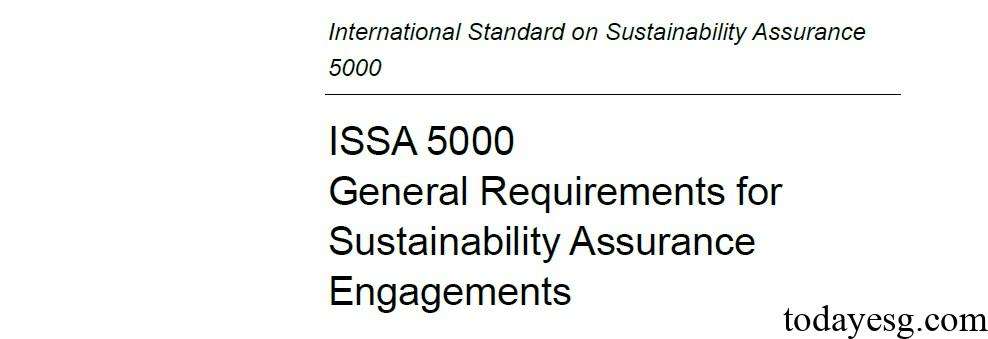International Standard on Sustainability Assurance ISSA 5000
The International Auditing and Assurance Standards Board (IAASB) releases the International Standard on Sustainability Assurance (ISSA 5000), aimed at improving the quality and consistency of global sustainability information disclosure.
The IAASB believes that stakeholders’ requirements for sustainable information are constantly increasing, and jurisdictions such as the EU have established mandatory assurance requirements to improve the quality of sustainable disclosure.
Related Post: KPMG Releases Global ESG Assurance Report

Background of International Standard on Sustainability Assurance
In September 2022, the International Auditing and Assurance Standards Board issued a project proposal to develop a sustainability report assurance standard that meets the needs of stakeholders and applies to information disclosure on all sustainability topics. In August 2023, the IAASB released the Exposure Draft of Proposed ISSA 5000, soliciting opinions from market participants.
In the process of developing international standards for sustainability assurance, the International Auditing and Assurance Standards Board referred to the following standards:
- Timelines: Focus on identified market demand while considering assurance quality.
- Relevance: Focus on emerging issues and the needs of stakeholders, as well as sustainable and verified environmental changes.
- Comprehensiveness: Focus on the degree to which exceptions to the assurance standards are addressed.
- Implementability: Focus on the assurance requirements of different.
- Enforceability: Focus on the responsibility of practitioners in sustainability assurance.
- Scalability: Focusing on the adaptability of companies of different sizes and complexities.
Introduction to International Standard on Sustainability Assurance
The International Standard on Sustainability Assurance involve the assurance of sustainable information, which refers to information related to sustainable matters, including different themes (climate, biodiversity, labor) and various aspects (risks, opportunities, indicators, and goals). The International Standard on Sustainability Assurance applies to all types of sustainable information and to all types of companies, and is capable of handling reasonable assurance and limited assurance.
Practitioners are required to apply ISSA 5000 to conduct business by December 2026. When conducting sustainable assurance services, practitioners need to confirm whether there are material errors in sustainable information, and express the conclusion of sustainable assurance (reasonable assurance or limited assurance) through a written report, and describe the basis of the conclusion. When unable to obtain a conclusion, practitioners may abandon the conclusion or withdraw from the business and take action in accordance with applicable regulatory policies.
Before conducting assurance services, practitioners need to comply with ISSA 5000 and accept or continue to be employed by the company if they meet the conditions. The person in charge of the assurance project needs to meet certain standards and fully and appropriately participate in the entire project, guide and supervise the assurance work, and assume overall responsibility. Practitioners need to communicate with the company management in a timely manner, record the basis of the assurance report, and organize these documents as work records.
When conducting assurance services, practitioners need to understand the scope of sustainable information and which sustainable information needs to be certified. Subsequently, practitioners need to discuss the terms of the assurance business with the company, such as objectives, scope, boundaries, standards, etc. Subsequently, practitioners need to obtain sufficient and appropriate evidence in order to assess whether there are material misstatements in sustainable information. Practitioners need to develop risk management procedures based on reasonable or limited assurance standards to address the risk of material misstatement. Practitioners can also obtain necessary information from the company’s management and other employees.
After the completion of the assurance business, practitioners need to form an assurance conclusion, stating whether there is no material misstatement of sustainable information due to fraud or error, and prepare an assurance report. The assurance report needs to clearly state in written form the reasonable or limited assurance conclusions of practitioners regarding sustainable information.
Reference:








